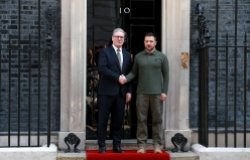
A blog of the Kennan Institute
Insights from the US Experience Can Help Ukraine Serve Its Veterans Better

Yulya_Chumak - Shutterstock - https://www.shutterstock.com/it/g/Yulya_Chumak
As Ukraine grapples with the effects of the ongoing war, the Ministry for Veterans Affairs acknowledges the urgent need to revamp state support systems. The failure to provide comprehensive veteran support became apparent with the outbreak of hostilities in 2022 and subsequent mass conscription, prompting Ukrainian NGOs and veterans associations to step in and fill the gap.
The government has responded to this need and tried to update the state’s support system for veterans, as set out in the draft law on the Basic Principles of State Veteran Policy. Several specifics from the US veterans’ programs could help guide the Ukrainian state as it continues this effort.
Ukrainian System of Veteran Support
The number of Ukrainian veterans has grown in the last ten years. Before February 24, 2022, approximately 500,000 individuals served under the Anti-Terrorist and Joint Forces Operations in the Donbas in 2014–2022. Since the start of the full-scale Russian invasion, the demand for veteran support services is expected to rise two or three times more. According to the ministry’s estimates, the number of citizens eligible for veteran status post-war may increase to four or five million persons.
Institutionally, the spine of governmental support for veterans is the Ministry of Veteran Affairs of Ukraine, which comprises seven departments and one special state endowment, the Ukrainian Veterans Fund. In 2024, almost 14 billion UAH were allocated to support veterans and their families, while 13.5 billion UAH were budgeted to finance other activities under the state veterans’ policy.
The efficacy of the ministry is widely questioned, even criticized, by veterans and civic activists. This led to the resignation of Minister of Veterans Affairs Yulia Laputina in February 2024. The decision was reportedly made to improve the ministry’s operations under a new leader. In the lead-up to that decision, the civic council—a counseling body comprised of activists and experts—at the Ministry of Veterans Affairs demanded Laputina’s resignation on the grounds that the ministry was not carrying out its work and cooperating with veterans effectively.
The core criticism concerns how the Ukrainian Veterans Fund is being used. According to a survey conducted among UAF veterans and servicepersons in January 2024 at the request of the Fund, there is a widespread view that this and other specialized state institutions do not fulfill their purpose in full. Support for veterans’ post-service professional and career development is regarded as ineffective, with a 55 percent negative assessment. Most respondents said state institutions must reduce their “bureaucracy” and simplify procedures for veterans to access support.
Current Ukrainian legislation offers more than forty benefits to war veterans, including those outlined in the law On the Status of War Veterans and Guarantees of Their Social Protection. Financial assistance and various forms of social support—such as housing provision (transitional period) and support for persons with disabilities incurred in war and for members of families of deceased defenders of Ukraine—are crucial for veterans’ successful transition to civilian life. Presently there is disarray in this area: the absence of a uniform approach and inadequate funding create a sense of isolation among veterans, who must confront challenges independently. Many existing social benefits and guarantees need to be updated to contribute more effectively to the active reintegration of veterans.
The Veterans Affairs System in the United States
In April, I attended a meeting in Washington as part of the Ukrainian delegation. During the meeting, my colleagues and I presented the results of our study comparing the support systems for veterans in the United States and Ukraine. Our report, published for Congress, outlined several recommendations to improve the support system for veterans in Ukraine. The recommendations covered such vital areas as legislation, health care, financial and social support, professional training, and veteran entrepreneurship.
The US Veterans Affairs system was selected as a blueprint for Ukrainian reform because of its comprehensive approach to policies for veterans. It is regulated by an extensive set of laws and regulations encompassing fifty-five relevant policies and acts. The American VA system comprises three organizations that administer veterans’ programs aimed at promoting veterans' welfare and providing exclusive benefits. These programs sidestep unnecessary administrative complexity and have generous funding (the 2024 budget for the Department of Veterans Affairs amounts to $325.1 billion).
Recommendations
Our study pinpointed some key practices Ukraine could adopt or adapt from the US system to improve support for veterans.
Include veterans’ support programs and benefits on the government DIIA portal. Digitalization can be an effective solution to reduce the excess bureaucracy involved in obtaining social guarantees and benefits. The Ukrainian government's digitalization program (DIIA) can be leveraged to achieve this goal for veterans. The DIIA portal allows electronic access, including on mobile devices, to more than seventy government services and fourteen digital documents, such as student IDs, foreign biometric passports, and birth certificates. It is a natural space to aggregate and provide access to veterans’ benefits and programs.
Adopt telemedicine and establish a system of electronic health records. Adopting telehealth technology like that used in US telehealth and telemedicine services can also improve access to care for veterans. Such services have both health and convenience benefits, as veterans can consult specialists without the need to travel large distances for care.
Electronic patient records, widely prevalent in the United States, reduce bureaucracy and simplify cooperation and the exchange of information among health care providers and facilities. The VA system run by the government is the Computerized Patient Record System. Ukraine would find adopting such a system particularly useful at the regional level. The Ukrainian health care system lags in this respect.
The survey requested by the Ukrainian Veterans Fund found that 52 percent of veterans surveyed needed immediate health care, while 63 percent mentioned experiencing health struggles in returning to civilian life. Reducing the administrative burden to accessing health care and accurate records would mitigate some of these struggles.
Financial support. For Ukrainian veterans, health care is not their only concern; they also need proper financial support. According to the survey, 56 percent of respondents indicated a need for state-provided financial support. Currently, most Ukrainian veterans receive a monthly payment of around $100.
Ukraine could adapt some of the programs that the United States uses to provide financial assistance to veterans: disability compensation, pension benefits, and health care benefits. Other benefits include various forms of tax exemptions, life insurance, mortgage insurance, and state-backed loans for home purchases, improvements, and repairs, which could help veterans secure financing from private lenders.
The Ukrainian government must revamp its current system to provide veterans with complete support with respect to rehabilitation and reintegration into civilian life after they have completed their service. Although the government strives to improve the support system for veterans, much work remains to be done to ensure they receive the necessary assistance. The recommendations proposed here can contribute more effectively to the active reintegration of veterans.
The opinions expressed in this article are those solely of the authors and do not reflect the views of the Kennan Institute.
See our newest content first.
Subscribe to receive the latest analysis from Focus Ukraine
About the Authors

Kennan Institute
The Kennan Institute is the premier US center for advanced research on Eurasia and the oldest and largest regional program at the Woodrow Wilson International Center for Scholars. The Kennan Institute is committed to improving American understanding of Russia, Ukraine, Central Asia, the South Caucasus, and the surrounding region though research and exchange. Read more













